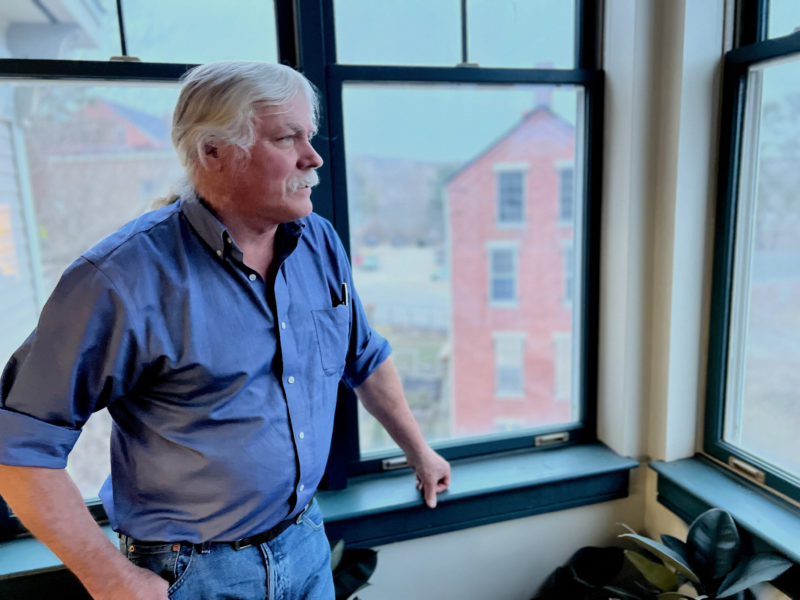
Seth Hall on the third floor of the Bug Tussle Annex, in a conference room overlooking Main Street.
Seth Hall dropped out of high school when he was 16, walked into the local Mercedes repair shop and talked his way into a job in Newton, Mass. He went on to be a steel worker and a tool maker.
Then one thing led to another and he was working at Digital Equipment Corporation making 780 VAX’s. He helped start their robotics program. He went next to U Mass-Amherst in the Department of Engineering where he helped build the first campus-wide network. Then to MIT where he worked until his retirement in 2016, doing advanced computing to support different research groups. During that time he also earned a Bachelor of Arts at Harvard.
He found a place to retire in Waldoboro on Craig’s List. The listing off Route 32 didn’t pan out, but Seth found another place nearby to put down roots.
Seth served on the planning board for five years, on the economic development committee, and the transfer station committee. He also served on two defunct committees — the communications technology committee and the renewable energy subcommittee.
“I’ll always be from ‘away.’ I’ll be that forever, but because I was raised as a Quaker, I believe in consensus, I believe in doing good stuff, and I believe in serving the community where I live. Ted Wooster was my model and one of my best friends.
“Ted was a townie. He believed in the people here and he owned the anchor institution, the local pharmacy. His father Frederick was the druggist before him, and when it was time, Ted took it over. For years, when people couldn’t afford their medicine, Ted made sure they got it, but when he got Parkinson’s, he had to stop working. I think not being able to be there for people was the thing that hurt him the most.
“He loved this community. He was embedded in it. A lot of people would say Ted talked a lot, and he did, but it was always about his community. He served for many, many years on the select board.
“When he left the board, I invited him to join the planning board and the renewable energy subcommittee. Ted was really proud of the solar array that the committee launched up at the transfer station. Every Wednesday night after meetings, Ted and I would hold court at a back table at the Narrows Tavern. Anyone could join us.
“We’d talk about how Waldoboro had some lousy deals like Sylvania pulling out and with them, 350 good-paying jobs. One Pie: same thing. Taction, or as they called themselves for customers, New England 800: they were in this building, a call center with 120 people working with full health insurance. A job like that could support a whole family. Then, those jobs went off-shore.
“Ted and I, we had all kinds of ideas to help Waldoboro. We resonated. I want to carry on his legacy so I bought this building. On the first floor, we have the remaining 25 or so employees working for AnswerNet, the successor to Taction. On the second floor we rent offices to therapists, psychologists, and educators and on the top floor, it’s a co-working space plus offices. It’s the BugTussle Annex Co-working space offering very high-speed fiber-optic broadband.
“One thing Ted and I would talk about is the need for people to be talking to each other so I’ve opened the large meeting room for free, to any 501(c)(3), any nonprofit to them. We even have had the local American 2nd Amendment Rights people meeting here.
“Ted was a visionary. Ted wanted to see more housing in town, so we had this idea of building apartments behind the Friendship block with starter units: rentals with single bedrooms built in a vertical townhouse-style, for local young people. Moderate-income housing, and I wanted the apartments to be energy efficient, passive house. And we’d improve the parking lot, and below that, build a boardwalk and a public playground leading to the Waldoboro Narrows Pool, which is a safe place for kids to go in.
I haven’t given up on this idea. Plan B is bringing it to the Brooder, the old Fieldcrest Home which sits on 13 acres. I would love to bring back Head Start, too, because Waldoboro is a nexus for Cushing, Friendship, and Warren, and Waldoboro needs it. It needs centers and playgrounds for children.
“We talk about the drug problem. If we could support families in the form of childcare, maybe more parents could work. Not to mention meals and play for three-year-olds, because we all know that when there’s early intervention, long term prospects for kids are huge. Ted knew this. He believed in this.
“I think if communities don’t have people like Ted, they’re sort of adrift. You need people who care. Ted knew every family in town. He knew that if you don’t invest in your community, it fractures and dissolves. There’s a reason a pharmacist might feel that way.
“Right now, we have a lot of little groups that do great work on their own: First Baptist Church, Broad Bay Congregational, The German Church, the Waldo Theatre, the shellfish harvesters, clubs, the library, Midcoast Conservancy, and more. But they are mostly their own entities. We have many common threads, but no common fabric.
“I know there’s reluctance to change, but everything is changing anyway. We can’t stop that. Money is coming in. There’s not much gentrification now, but more is inevitable.
“We need to think about incremental development now, so we can shape it. We can make it to serve local people, the people who live here year-round. A public park downtown could be part of that. Imagine a place for families to bring their kids: swings and a jungle gym, a walkway, a gazebo, music; and maybe even a good family restaurant.”






